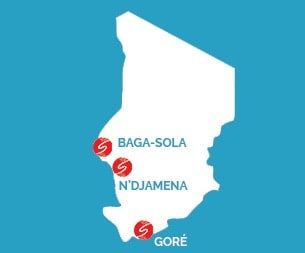
Context
This crisis plays out against a backdrop of structural poverty, very low development of infrastructure and public services, and extreme weather events as a result of climate change.
One of the worst affected areas in the country is Lake Chad province. Local populations have been forced to flee due to protection incidents against civilians, climate shocks, increasing food and nutrition insecurity, and health crises.
The already critical food situation looks set to worsen dramatically in 2023, in the aftermath of severe flooding in 2022. According to estimates, during the lean season from June to August 2023, 25-30% of the population living in Lake Chad province will be faced with serious food and nutrition insecurity.
- 17.77 million inhabitants
- 190th out of 191 countries on the Human Development Index
Our action

-
Mission
opened in 2008 - Team 26 national staff
- Budget 1.15M€
During 2022, SOLIDARITÉS INTERNATIONAL expanded its activities in Lake Chad province to improve access to water for the most vulnerable populations. Thanks to our partnership with a local NGO, our teams reached people in difficult-to-access areas where there is very little humanitarian assistance.
In parallel, our NGO continued its water, sanitation and hygiene (WASH) and food security activities in southern Chad.
2022 marked the completion of the Inclusive Development Program in Host Areas. This program, which was launched in 2018, has enabled over 15,000 people to gain better access to basic services, social welfare systems, economic opportunities and jobs.
Institutional and private funding partners AFD, CDCS, EUD
Operating partners ACHDR, IHDL
Our impact

Rapid, appropriate multi-sectoral responses to emergencies
- Meeting the immediate, vital needs of people affected by shocks
- Maintaining active humanitarian surveillance and coordinating responses with other organizations

Access to essential goods and services, livelihood recovery
- Improving people’s incomes and protecting their livelihoods
- Bolstering food and nutrition security within communities
- Increasing access to basic services

Improving the resilience of individuals, communities and institutions
- Helping villages and communities prepare responses to shocks
- Strengthening community infrastructure and market systems
- Improving the resilience of households
Should you have any questions, please contact Xavier Lauth

Vacancies
At head office
Worldwide
Internships
